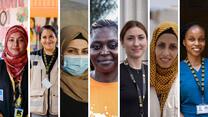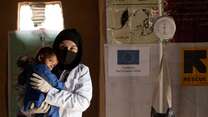
The East Africa region has been grappling with some of the worst droughts in recent decades, severely affecting countries like Kenya. In 2023, Kenya endured a devastating drought, which was later followed by significant flooding in 2024 between April and May.
The country is seeing a sharp rise in food insecurity, which has contributed to an increase in malnutrition cases. In 2023, nearly 4.5 million people in Kenya were affected by hunger, including about 1 million children under five suffering from acute malnutrition.
The situation has also impacted over 623,000 refugees and asylum seekers currently hosted by Kenya. The rise in malnutrition is posing a significant threat to the health and well-being of camp residents, particularly young children. Acute malnutrition has further made these residents vulnerable to illnesses, infections, and diseases such as malaria.
A grandmother’s strength: caring for her grandson after tragedy
Halima Hilowle, a Somali woman in her 50s, fled her home country due to political instability and now resides in Kakuma Camp, located in Turkana County in northwestern Kenya.
She found hope when her daughter became pregnant, supported by the IRC’s prenatal care. However, complications during childbirth required an urgent transfer from Ammussait General Hospital to Lodwar County Hospital, over an hour away. After three days, Halima received the devastating news of her daughter's passing.
Now, she is left to care for her four-month-old grandson, Abdishakur, ensuring his well-being and health. With support from the IRC, funded by the European Union, he has received infant formula and essential medical care.

“The International Rescue Committee (IRC) has been helping me with Infant formula for the baby and general treatment when he gets unwell.”
Ensuring health and growth
With each passing day, she cared for him, ensuring he received regular check-ups, immunizations, and growth monitoring through the IRC, funded by the European Union, at the main hospital in Kakuma and 5 health posts.
Though he occasionally falls ill, particularly with colds, he has gained weight and continues to grow stronger.
The loss of her daughter continues to weigh heavily on Halima, leaving an emotional burden that is hard to bear. Raising Abdishakur has brought both comfort and challenge, as he requires constant care and attention. While she depends on her family for emotional support, the uncertainty of life in the camp only deepens her worries.
Despite the hardships, Halima remains determined to give her grandson the best life possible. She dreams of him growing up healthy and strong.

Seeking help from the IRC
Another young mother who turned to the IRC clinics for her baby’s health and well-being is Damac Decow.
Damac is in her 20s from Somalia and is now living in Hagadera, Kenya. Her daughter, Nimo, had been unwell since birth. Having already suffered the heartbreaking loss of a child, Damac knew she had to seek help as she could not bear to go through that pain again.
Living in a community with limited access to healthcare, her options were scarce. But she had heard about the IRC hospital which is the only facility in the area providing medical care and nutrition support. It was her best and only hope.
When Nimo’s condition worsened, Damac did not hesitate.

She walked the short distance to the hospital, where doctors quickly admitted her baby. Nimo was hospitalized twice, and when she was discharged at seven months old, Damac thought the worst was over. But malnutrition had taken a severe toll on Nimo’s fragile body. A few months later, Nimo had to be readmitted into the Outpatient Therapeutic Program.
At the hospital, the IRC team, in collaboration with the EU Humanitarian Aid, provided Nimo with essential nutrition supplements and medical care, closely monitoring her recovery. Damac watched as her daughter slowly regained her strength. And with each small victory, hope replaced fear. The hospital staff also took the time to educate her about proper hygiene and nutrition.

“I was also educated on proper hygiene practices, such as handwashing, especially before feeding my baby.”
They showed her how to wash her hands before feeding Nimo and stressed the importance of giving her the prescribed supplements twice a day that are critical for her recovery.
Today, after months of treatment, Nimo is a different child. Her weight has increased and her energy has returned.
“Since then, my child has been on malnutrition treatment, and her health has greatly improved—she has recovered and is now very healthy.”
How the IRC with EU support is combating malnutrition in Kenya?
With support from the European Union's humanitarian aid, the IRC is working to combat malnutrition in various camps and regions across Kenya. As the lead health organization and implementing partner in Kakuma and Hagadera, the IRC is committed to ensuring children receive proper nutrition and are protected from all forms of malnutrition.
This is achieved through the operation and maintenance of 10 health facilities (7 in Kakuma and 3 in Hagadera) of varying levels, offering a wide range of services including sexual and reproductive health, nutrition, water sanitation and hygiene, economic recovery and development and education.
The International Rescue Committee partners with the European Union to provide life-saving support to people caught in conflict and disasters around the world. Our work funded by the EU enables people to survive, recover and rebuild their lives.



